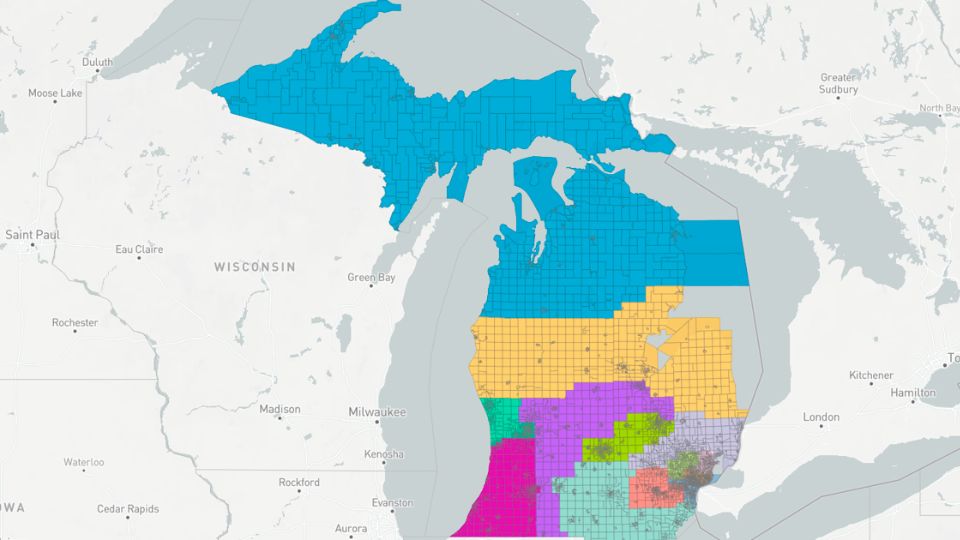During the Michigan redistricting commission’s meeting on Tuesday, a pressing concern emerged regarding the extent to which the redrawing of seven Michigan House seats, deemed invalid by federal courts, would impact the surrounding region.
In a recent development, it has been revealed that seven state House districts have been deemed invalid. This decision was made by three federal judges who have also stated that redrawing the boundaries of these districts will likely lead to adjustments in neighboring districts, if deemed necessary.
The commissioners had varying opinions on what constituted reasonableness and ultimately agreed to develop multiple map options. Some of these options would be narrowly focused to minimize changes to neighboring districts, while others would extend into several Metro Detroit districts.
Commissioner Anthony Eid emphasized the need for accountability, stating that there must be a point where the commission’s changes come to a halt. “…”Excessive changes can have negative consequences. The districts have already been voted on. These districts are legal.
Commissioner Rebecca Szetela contended that according to the federal judges’ ruling last month, all Metro Detroit districts were deemed victims of a racial gerrymander and therefore in need of a redraw. In their Dec. 21 decision, she referred to a section where the commission acknowledged that the Detroit-area districts were primarily drawn based on race. The specific districts that were challenged were no different in this regard.
The attorneys representing the commission emphasized that the decision permits modifications to districts that are not under the court order, but only to the extent that they are deemed “reasonably necessary.” “It is crucial for us to remain mindful and informed about this,” attorney Nathan Fink informed the commissioners.
A report released on Tuesday by Michigan State University’s Institute for Public Policy and Social Research suggests that the redrawing of districts could be accomplished with minimal disruption to the surrounding areas. In the report, a revised House map was presented as a “proof of concept” to demonstrate that the seven invalid districts could be redrawn with minimal impact on three other districts.
Also Read: Local School Districts Decide if and When to Call it a Snow Day
In a significant development, the commission engaged in a heated debate as it embarked on the task of redrawing 13 Detroit House and Senate districts. These districts were deemed to be in violation of the Equal Protection Clause by a federal court due to their heavy reliance on racial considerations.
The commission has taken its case to the U.S. Supreme Court, seeking a favorable ruling. However, until the high court makes a decision, the panel is obligated to proceed with redrawing the districts that have been deemed invalid. In a recent meeting, the commission’s lawyers emphasized to the commissioners the importance of not taking race into account when redrawing the Detroit districts.
In a recent development, the federal courts have granted permission for the commission to give priority to the seven challenged House districts. This decision comes as the Senate districts, which are not up for re-election until 2026, take a backseat in the proceedings. According to the court’s schedule, the commission is required to finish drafting House maps by Feb. 2. The court will then review and approve the final maps by March 29.
In a recent development, a special master has been assigned the responsibility of redrawing the state House and Senate maps. This move comes as a precautionary measure in case the redistricting commission is unable to meet the deadline or adhere to the court’s instructions.
The House districts that have been ordered to be redrawn are districts 1, 7, 8, 10, 11, 12, and 14. There is a strong possibility that districts 9 and 13 will undergo redrawing due to their proximity to invalid districts. On Tuesday, several proposed plans extended beyond their initial districts, encompassing neighboring House districts 2, 4, 5, and 6.
The commission’s efforts to redraw the maps resulted in significant changes, particularly in the districts around 8 Mile. These changes aimed to address the issue of invalid districts that span across Macomb and Oakland counties, separating them from Wayne County. Previous maps faced criticism for their elongated design, extending from the predominantly Black city of Detroit into the predominantly White suburbs of Oakland County.



Leave a Reply